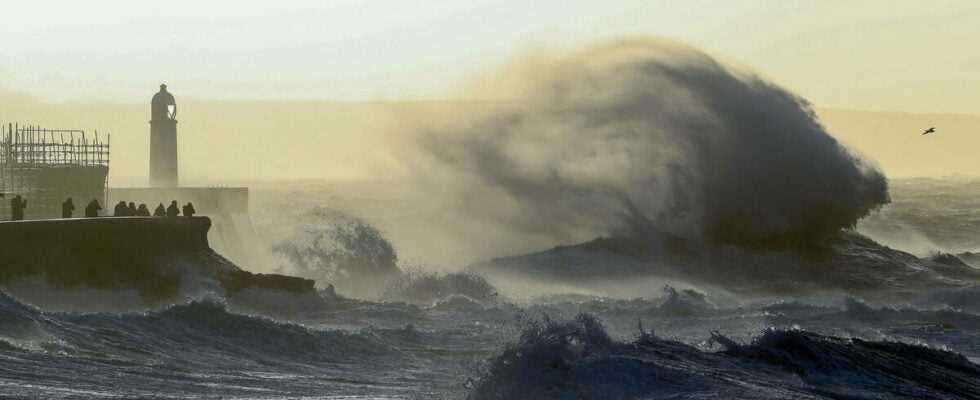Storm Eunice continues to sweep northwestern Europe on Saturday with strong gusts still expected on the German coasts, leaving in its wake significant material damage and at least nine deaths.
In France, waves sometimes exceeding 9 meters were recorded in Brittany, as well as gusts of wind locally reaching 176 km / h at Cape Gris-Nez (Pas-de-Calais). In the north of the country, 6 people were seriously injured and 17 more lightly in wind-related road accidents, due to falling trees or materials.
On Saturday, around 75,000 homes remained without electricity in the Nord and Pas-de-Calais after the passage of the storm. “The strong mobilization of the Enedis teams made it possible to resupply 60% of the homes”, but at 8 a.m., 40,000 homes in Pas-de-Calais and 35,000 in the North were still without electricity, the network manager said in a press release. At the height of the storm on Friday afternoon, the number of households affected had reached 170,000 throughout Hauts-de-France, including 160,000 in the former Nord-Pas-de-Calais.
This Saturday, “the refeeding continues with the 350 Enedis technicians already on site, 50 people in support […]100 employees of specialized partner companies mobilized and 100 people in reinforcement» other regions, says the Enedis press release.
show of desolation
Formed in Ireland, the storm passed Friday over part of the United Kingdom then northern France, Benelux, before continuing its route towards Denmark and Germany, of which a large northern third was placed on red alert until Saturday morning.
“There is a risk of severe storm force gusts (level 3 out of 4). Maximum gust: 100-115 km/h”, warned the German meteorological services, warning of the risks of uprooted trees, falling branches or even damaged roofs. “In particular please keep away from buildings, trees, scaffolding and high voltage lines. If possible, avoid staying outside,” they implored.
Because this storm left a spectacle of desolation in its path and caused significant disruption. Hundreds of flights, trains and ferries were canceled across northwestern Europe in the face of extreme-force winds from Storm Eunice, which rolled in less than forty-eight hours after Storm Dudley (at least 6 dead in Poland and Germany).
At this stage, 14 deaths have been recorded because of Eunice. Last death reported in the early morning by the police in Germany: a driver killed by the fall of a tree on his vehicle in Altenberge, in North Rhine-Westphalia, not far from the city of Münster. In the Netherlands, four people were killed, according to the country’s emergency services, by falling trees or in accidents. In The Hague, dozens of houses were evacuated for fear of the collapse of the bell tower of a church. In the southeast of Ireland, police announced the death of a 60-year-old man. In London, a woman in her thirties was fatally injured in the afternoon when a tree fell on the car in which she was a passenger and a man in his fifties was killed near Liverpool (north-west of England) when debris hit the windscreen of the vehicle he was traveling in. In Belgium, finally, a 79-year-old Canadian who lived on a boat in the marina of Ypres, not far from Lille, died after falling into the water while trying to recover stolen objects.
While climate change generally reinforces and multiplies extreme events, it is not so clear for winds and storms (excluding cyclones), the number of which varies greatly from one year to another. The latest report from UN climate experts (IPCC), published in August, estimates, with only a very low degree of certainty, that there may have been an increase in the number of storms in the northern hemisphere since the years 80.
Update at 10 a.m. with details of homes without electricity in France and at 7 p.m. on the new toll of 14 dead.
